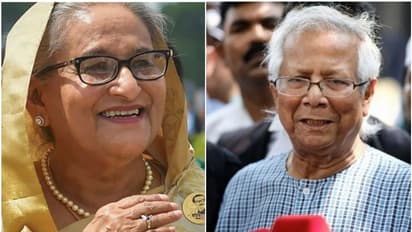“If India wants to keep her until the time Bangladesh (government) wants her back, the condition would be that she has to keep quiet,” Yunus declared.
In an interview with news agency PTI at his official residence in Dhaka, Yunus, who was appointed Chief Advisor following Hasina’s departure, underscored Bangladesh’s desire for robust relations with India. However, he emphasized that New Delhi must transcend the narrative that paints every opposition party in Bangladesh as extremist and perpetuates the notion that only Hasina can safeguard the nation from becoming another Afghanistan.
“No one is comfortable with her stance there in India because we want her back to try her. She is there in India and at times she is talking, which is problematic. Had she been quiet, we would have forgotten it; people would have also forgotten it as she would have been in her own world. But sitting in India, she is speaking and giving instructions. No one likes it,” Yunus lamented.
Yunus was referring to Hasina’s inflammatory remarks on August 13, where she called for “justice” for recent “terror acts,” emphasizing the need for thorough investigations and accountability.
“It is not good for us or for India. There is discomfort regarding it,” Yunus told PTI.
Following a wave of unprecedented anti-government protests that culminated on August 5, Hasina resigned and sought refuge in India. Her continued presence has stoked considerable speculation within Bangladesh.
When queried about Bangladesh’s communication with India regarding Hasina’s activities, Yunus confirmed that the message has been conveyed explicitly and with resolve, "she must maintain silence."
“Everyone understands it. We have said quite firmly that she should keep quiet. This is an unfriendly gesture towards us; she has been given shelter there and she is campaigning from there. It is not that she has gone there on a normal course. She has fled following a people’s uprising and public anger,” Yunus asserted.
The interim government remains steadfast in its commitment to deliver justice for the Bangladeshi populace, and Yunus stressed that Hasina’s return is crucial for this process.
“Yes, she has to be brought back or else the people of Bangladesh won’t be at peace. The kind of atrocities she has committed, she has to be tried in front of everyone here,” he emphasized.
On the future of Bangladesh-India relations, Yunus expressed a desire for a cordial partnership but insisted that India must shed the prevailing narrative that only Hasina’s leadership can ensure stability in Bangladesh.
“The way forward is for India to come out of the narrative. The narrative is that everybody is Islamist, the Bangladesh Nationalist Party (BNP) is Islamist, and everyone else is Islamist and will make this country into Afghanistan. And Bangladesh is in safe hands with Sheikh Hasina at the helm only. India is captivated by this narrative. India has to come out of this narrative. Bangladesh, like any other nation, is another neighbour,” he said.
Addressing the recent unrest involving attacks on Hindu minorities, Yunus dismissed concerns raised by India as pretexts. He suggested that exaggerating the plight of minorities serves merely as a diversion.
“The issue of trying to portray the conditions of minorities in such a big way is just an excuse,” he remarked.
During the student-led violence following Hasina’s ouster, Hindu businesses and temples faced significant vandalism. Indian Prime Minister Narendra Modi, in his Independence Day address on August 15, expressed hope for a swift return to normalcy in Bangladesh, emphasizing the concern of 1.4 billion Indians for the safety of minorities there.
Yunus, the venerable Nobel laureate, underscored the necessity for cooperative efforts between India and Bangladesh to mend their currently strained relationship.
“We need to work together to improve this relationship, which is now at a low,” he said.
Regarding potential revisions to bilateral treaties, Yunus noted ongoing calls to reassess agreements such as those concerning transit and the Adani electricity deal, which has been criticized for exerting substantial pressure on the Bangladeshi populace.
“Everybody is saying that it is needed. We will see what is on paper and, second, what is actually happening on the ground. I can’t answer it specifically. If there is any need to review, we will then raise questions about it,” he concluded.
The BNP has indicated that, if victorious, it will scrutinize and possibly renegotiate the contentious Adani electricity deal, citing its significant impact on the people of Bangladesh.
